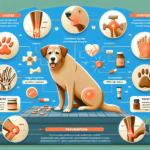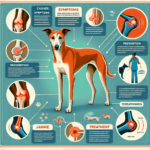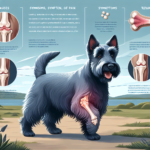Mudi Joint Pain: Causes, Symptoms, Prevention, and Treatment

Introduction
The Mudi is a versatile and intelligent herding breed originating from Hungary. Known for its agility, keen senses, and hardworking nature, the Mudi has been a valuable asset to farmers for centuries. This medium-sized breed is characterized by its curly coat, expressive eyes, and a tail that curls over its back. Despite its relatively small size, the Mudi is a robust and energetic dog, excelling in various activities such as herding, agility, and obedience competitions.
Like many breeds, the Mudi is prone to certain health issues, with joint pain being a significant concern. Joint health is crucial for the Mudi, given its active lifestyle and the physical demands placed on its body. Understanding the causes, symptoms, prevention, and treatment of joint pain in Mudis is essential for ensuring their well-being and maintaining their quality of life.
Breed-Specific Joint Pain Risks
Genetic Predisposition
The Mudi, like many other breeds, can be genetically predisposed to joint-related issues. Common conditions include hip dysplasia, elbow dysplasia, and arthritis. Hip dysplasia is a hereditary condition where the hip joint does not fit properly into the hip socket, leading to pain and mobility issues. Elbow dysplasia involves abnormal development of the elbow joint, causing lameness and discomfort. Arthritis, a degenerative joint disease, can also affect Mudis, leading to chronic pain and stiffness.
Age-Related Risks
As Mudis age, the risk of developing joint pain increases. Senior Mudis are more susceptible to arthritis and other degenerative joint conditions. Typically, signs of joint pain may start to appear in Mudis around the age of 6-8 years, although this can vary depending on the individual dog’s genetics and lifestyle.
Activity Level and Joint Stress
The Mudi’s high energy levels and active lifestyle can contribute to joint stress. These dogs are often involved in herding, agility, and other physically demanding activities, which can put additional strain on their joints. While regular exercise is essential for maintaining overall health, excessive or high-impact activities can exacerbate joint issues in Mudis.
Common Symptoms of Joint Pain in Mudis
General Symptoms
- Limping or favoring one leg
- Stiffness, especially after rest or exercise
- Reluctance to jump, run, or climb stairs
- Decreased activity or interest in play
- Swelling or heat around the joints
- Whining or showing signs of discomfort when touched
Breed-Specific Symptoms
In Mudis, joint pain may manifest as a reluctance to perform tasks they previously enjoyed, such as herding or agility exercises. Owners may also notice changes in their dog’s gait or posture, as well as a decrease in overall enthusiasm and energy levels.
When to Consult a Vet
If you observe any of the above symptoms in your Mudi, it is essential to consult a veterinarian. Early diagnosis and intervention can help manage joint pain more effectively and improve your dog’s quality of life. Regular veterinary check-ups are also crucial for monitoring your Mudi’s joint health and catching any issues early.
Preventive Measures for Joint Health
Exercise Recommendations
Regular, moderate exercise is vital for maintaining joint health in Mudis. Activities such as walking, swimming, and controlled play can help keep their joints flexible and muscles strong. Avoid high-impact activities like excessive jumping or running on hard surfaces, as these can increase the risk of joint damage.
Dietary Suggestions
A balanced diet rich in essential nutrients can support joint health in Mudis. Consider incorporating foods or supplements that contain glucosamine, chondroitin, and omega-3 fatty acids, which are known to promote joint health and reduce inflammation. Consult your veterinarian for specific dietary recommendations tailored to your Mudi’s needs.
Weight Management
Maintaining a healthy weight is crucial for reducing joint stress in Mudis. Excess weight can put additional pressure on the joints, exacerbating pain and discomfort. Monitor your Mudi’s weight regularly and adjust their diet and exercise routine as needed to keep them at an optimal weight.
Early Screening and Monitoring
Regular veterinary check-ups and early screening for joint issues can help catch problems before they become severe. Your veterinarian may recommend specific tests, such as X-rays or joint fluid analysis, to assess your Mudi’s joint health. Early intervention can significantly improve the prognosis for dogs with joint conditions.
Treatment Options for Joint Pain
Non-Surgical Treatments
Non-surgical treatments for joint pain in Mudis include medications, physical therapy, and lifestyle adjustments. Anti-inflammatory drugs and pain relievers can help manage pain and reduce inflammation. Physical therapy, including exercises and massage, can improve joint mobility and strength. Lifestyle adjustments, such as providing a comfortable bed and avoiding high-impact activities, can also alleviate joint pain.
Surgical Options
In severe cases, surgical intervention may be necessary to address joint pain in Mudis. Common surgical options include hip replacement, arthroscopy, and joint fusion. These procedures can help restore joint function and reduce pain, but they also come with risks and require a significant recovery period. Consult your veterinarian to determine the best course of action for your Mudi.
Alternative Therapies
Alternative treatments such as acupuncture, hydrotherapy, and chiropractic care can also benefit Mudis with joint pain. Acupuncture involves inserting thin needles into specific points on the body to relieve pain and promote healing. Hydrotherapy, or water therapy, can improve joint mobility and reduce pain through low-impact exercises in water. Chiropractic care focuses on aligning the spine and joints to improve overall function and reduce discomfort.
Lifestyle and Management Tips
Daily Care Routine
A consistent daily care routine can help manage and alleviate joint pain in Mudis. This routine may include gentle exercises, regular grooming, and administering any prescribed medications or supplements. Providing a comfortable and supportive bed can also help reduce joint pain and improve your Mudi’s quality of life.
Modifying the Home Environment
Making adjustments to your home environment can make a significant difference for a Mudi suffering from joint pain. Consider installing ramps to help your dog navigate stairs or get onto furniture. Orthopedic beds can provide additional support and comfort for sore joints. Ensure that your home is free of slippery surfaces that could cause your Mudi to slip and injure themselves.
Long-Term Management
Long-term management of joint pain in Mudis involves a combination of regular veterinary care, appropriate exercise, a balanced diet, and weight management. Consistent monitoring and early intervention can help keep your Mudi active and happy despite joint pain. Building a strong relationship with your veterinarian and following their recommendations is crucial for managing your dog’s joint health effectively.
FAQs About Mudis and Joint Pain
What are the early signs of joint pain in Mudis?
Early signs of joint pain in Mudis include limping, stiffness, reluctance to move, and decreased activity levels. If you notice any of these symptoms, consult your veterinarian for a thorough evaluation.
Can joint pain in Mudis be prevented?
While it may not be possible to prevent joint pain entirely, taking preventive measures such as regular exercise, a balanced diet, weight management, and early screening can significantly reduce the risk and severity of joint issues in Mudis.
Are there specific exercises that are better for Mudis with joint pain?
Low-impact exercises such as walking, swimming, and controlled play are ideal for Mudis with joint pain. These activities help maintain joint flexibility and muscle strength without putting excessive strain on the joints.
What dietary supplements can help support joint health in Mudis?
Supplements containing glucosamine, chondroitin, and omega-3 fatty acids are known to support joint health and reduce inflammation. Consult your veterinarian for specific recommendations tailored to your Mudi’s needs.
When should I consider surgical options for my Mudi’s joint pain?
Surgical options should be considered when non-surgical treatments are no longer effective in managing your Mudi’s joint pain. Consult your veterinarian to determine the best course of action based on your dog’s specific condition and overall health.
Conclusion
Joint pain is a common concern for Mudis, but with proper care and attention, it can be managed effectively. Understanding the causes, symptoms, prevention, and treatment options for joint pain in Mudis is essential for ensuring their well-being and maintaining their quality of life. By taking preventive measures, providing appropriate care, and consulting your veterinarian regularly, you can help your Mudi live a happy, active, and pain-free life.




